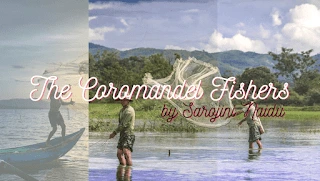

Prepare. Practise. Participate.

Prepare. Practise. Participate.

The Coromandel Fishers: A Poem of Hope and Courage
About the poet
Sarojini Naidu is an Indian poet, feminist, political activist, and patriot. She is recognized as ‘the Nightingale of India’ till now. She was awarded the Kaisar-i-Hind Medal by the British government.
About the poem
● The theme of the poem ‘The Coromandel Fishers’ by Sarojini Naidu revolves around the pride and unity of the fishermen and the beauty of the sea. It also metaphorically portrays the daily struggle of Indian freedom fighters and the glory of the motherland.
● The poem focuses on the lifestyle and daily struggle of the fishermen to attain their livelihood.
● It is written in an inspirational tone.
● It consists of three quatrains and follows the rhyme scheme -aabb aabb aabb.
Word-Meaning
♦wakening skies-sky is about to wake up, ♦dawn-early morning, ♦catamarans-fast sailing boat, ♦sea-gull-sea bird, ♦comrades-friends, ♦glade-an open space in the forest, ♦foam-small bubbles formed on or in liquid, ♦kiss of the spray-water comes out of the waves, ♦glee-great delight
Substance
In the poem, “The Coromandel Fishers, the poetess encourages the fishing community on the eastern coast of India and says about the wakening skies welcoming the morning and the wind lying asleep in the arms of the dawn like a child who has cried all night. She advises the fishermen to collect their nets and set their boats free to capture the fish as they are the kings of the sea. She instructs them not to delay and follow the seagull to find out the fish. According to her, the sea provides them with livelihood as their mother, the cloud guides them showing the proper direction of the wind as their brother and the waves move with the boat controlling the wind’s speed as their companions. Even if they are in the sea during the sunset, they do not need to worry as the sea god will protect them. There are many sweet things such as the shade of the coconut glade, the scent of the mango grove, the sand which holds the reflection of the full moon in the night, and the sound of our dear ones. But water comes out of waves that seem to be kissing us and the dance of the wild foam’s glee is sweeter. So the fishermen should row their boats to the borderline where the low sky embraces the sea. On the surface level, the poem seems to be an inspiration to the fishermen, but in reality, it is the poet’s call for the freedom fighters of India. According to her, our motherland welcomes Independence, and the British are so tired after ruling over India for a long time. So Indian freedom fighters should collect their weapons and achieve their Independence as India belongs to them. They should follow their leader to be directed towards Independence. Having Independence is sweeter than the temporary comforts and happiness under British rule. So the freedom fighters should fight against the British till the last and get their motherland free.
Multiple Choice Questions
1. In the poem ‘Coromandel Fishers’, the poet addresses- a) the youth b)the fishermen c)the children d)the common people
2. The wind has been compared to a-a) a monster b) a child c) a magician d) a man
3. The ‘wakening skies’ in the poem ‘The Coromandel Fishers’ a)pray to the morning light b)the Moon c)Flora d)Odin
4. Which poets influenced Sarojini Naidu’s poems?
a) Colombian poets b)British Romantic and Victorian poets c)Indian poets d)Irish poets
5. The phrase ‘leaping wealth of the tide refers to – a)fish b)soil c)metal d)gems
6. In ‘The Coromandel Fishers’ the fishermen should follow the track of the seagulls so that- a)they can easily find fish b)they can find out the way of life c)they get wealth d)they can swim
7. According to the fishermen, the sea is their mother because- a) they get disadvantages from the sea b)they get their livelihood from the sea c)they swim in the sea d)they explore themselves in the sea
8.”The wind lies asleep in the arms of the dawn”-Identify the figure of speech used in this line.
a)Personification b)Oxymoron c)antithesis d)apostrophe
9. Who were the kings of the sea?
a)sky b)fish c)sea-gulls d)Fishermen
10. ‘The wakening skies pray to the morning light’ — which figure of speech is used in this line?
a)apostrophe b)antithesis c)oxymoron d)Personification
11. The poet refers to _____ as the “leaping wealth” of the tide.
a)fish b)nets c)sea-gulls d)catamarans
Short Answer Type Questions
1.What is meant by the phrase ‘Let us set our catamarans free’?
Ans: After their work is over the fishermen tie their boats for safety in the evening. The next day when they start their work, they make their boat free from the shackles. So the leader fisherman called his fellow fishermen to get their boats out of shackles.
2.What happens if the fishermen are late in their work?
Ans: If the fishermen are late in their work ,the wind will blow and disrupt their work. Again, It is calm and quiet in the early morning which is suitable for the fishermen to start their work.
3.In what way are the fishermen the ‘kings of the sea’?
Ans: The fishermen can roam freely across the sea. They can capture ‘the leaping wealth of the tide’. So the fishermen are the kings of the sea.
4. How is the wind described in the poem?
Ans: Wind is described as if it sleeps in the arms of dawn.
5.Why is the wind compared to a child?
Ans: The wind has been compared to a child because the wind had roared hard the previous night like a weeping child and this morning it is as calm as a sleeping child who sleeps in the morning after crying a lot in the night.
Long Answer Type Questions
1. Whom does the poet address in the poem ‘Coromandel Fishers’? Who is the speaker in the poem,’ The Coromandel Fishers’? What does the phrase ‘the leaping wealth of tide’ refer to? Why do the fishermen prefer the dangers of the sea to the comfort of the land? Who is the speaker in the poem?
Ans: The poet addresses the fishermen in the poem ‘Coromandel Fishers’.
The speaker in the poem ‘The Coromandel Fishers’ is the leader of the fishermen.
The leaping wealth of the tide refers to fishes.
The sea provides the fishermen with livelihood and presents them with an opportunity for adventure. Hence, they prefer the foam of the waves and the kiss of the salty water of the sea.
The speaker of the poem is the leader of the fishermen.
2. Why are the nets to be gathered? What is meant by ‘the waves are our comrades all’? Why are the fishermen confident that they will be protected?
Ans: Nets are to be gathered to catch the fish.
Waves help the fishermen by controlling their speed so that the boats of the fishermen will not be drowned. like their companions. Because of the cooperation of the waves as the best companions, the fishermen consider the waves as their comrades.
The fishermen are confident because they believe that the Sea God will take care of them with protection.
3. Why does the poet say ‘sea is our mother and the cloud is our brother’? Why does the poet ask the fishermen to follow the seagull’s call? What are the problems faced by the fishermen?
Ans: The fishermen were born near the sea and brought up there. The sea sustains and feeds them as a mother. It is a source of wealth for them as they earn their livelihood by eating, selling, and transporting the fish. So they call the sea their mother. Again cloud helps them as a brother during their work. It will not let out the rain which hinders their work. So they call the cloud their brother.
According to the poet, the seagull only knows where the fish is. So only the seagull can lead them to their destination. So the poet asks the fishermen to follow the ‘sea-gull’s call’.
The fishermen sometimes face danger from formidable enemies like storms, rains, and thunderstorms. Moreover, after sunset, the sea gets very rough. At this time the fishermen’s boats toss up and down. Thus the fishermen face formidable dangers when they go out to the sea.
4. “he who holds the storm by the hair”-Who does he refer to? What are the sweet things? What is considered to be the sweetest thing?
Ans: “he who holds the storm by the hair”-He refers to the Sea God.
There are a few things that are sweet such as -i) shade which is gifted by the groves of coconut trees, ii) the pleasing scent of mango groves, iii)sand at the full ‘O’ moon iv) the Sound of the voice of their relatives that they love.
The kiss of the spray and dance of wild foam’s glee is the sweetest thing.
Exercise
A. Answer the following questions in one or two sentences:
1. In what manner did the wind lie asleep in the arms of the dawn?
2. What is the role of the sea god in the lives of the fishermen?
3. Why do the fishermen feel that the sea is their mother?
4. What is known as ‘the kiss of the spray’?
5. Why are the coromandel fishers not scared of fishing late in the dark?
6. Where does Sarojini Naidu find sweetness?
7. To whom do the fishermen pray?
8. What do the fishermen urge their fellow fishermen?
9. How does the poetess describe a day in the lives of the fishermen?
10. Who is the mother, brother, and comrades in the poem?
11. Comment on the last line of the poem – ‘Row, brothers, row to the edge of the verge’.
B. Answer any two of the following questions in 100 words :
1. How does Sarojini Naidu describe the wind in the poem ‘The Coromandel Fishers’?
2. Write a summary of ‘The Coromandel Fishers’.
3. Justify the title of the poem ‘The Coromandel Fishers’.
4. The poem ‘The Coromandel Fishers’ is a passionate call to the Indian fisherfolk. Justify the statement with close reference to the poem.
5. How does the poet motivate the “brothers”?
6. Comment on how nature is projected in the poem.
7. Comment on the use of figures of speech in the poem.
C. Do as directed:
1. The wind lies asleep in the arms of the dawn like a child that has cried. (Rewrite using participle)
2. Let us gather our nets from the shore and set our catamarans free. (Change the voice)
3. The fisherman said, “Rise, brothers, rise; the wakening skies pray to the morning light.” (Change the narration)
4. Sweet is the shade of the coconut glade. (Change into a complex sentence)
Disclaimer: This content is created solely for educational and informational purposes. It draws upon publicly available educational materials, literary texts, and the author’s own interpretation. All summaries, analyses, and explanations are original and intended to support learning. No copyright infringement is intended.